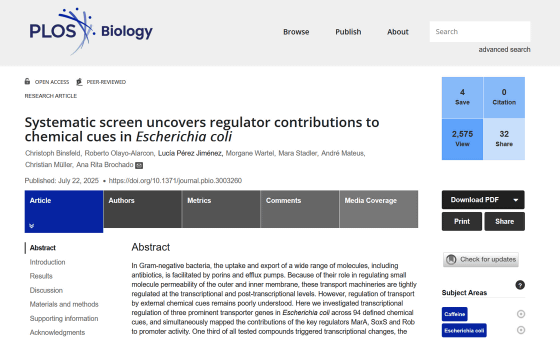It turns out that caffeine contained in coffee and tea may weaken the effectiveness of antibiotics

Systematic screen uncovers regulator contributions to chemical cues in Escherichia coli | PLOS Biology
https://journals.plos.org/plosbiology/article?id=10.1371/journal.pbio.3003260

Study finds caffeine can weaken effectiveness of certain antibiotics | University of Tübingen
https://uni-tuebingen.de/en/university/news-and-publications/press-releases/press-releases/article/study-finds-caffeine-can-weaken-effectiveness-of-certain-antibiotics/
Mixing Coffee And Antibiotics Could Be a Bad Idea, Study Shows : ScienceAlert
https://www.sciencealert.com/mixing-coffee-and-antibiotics-could-be-a-bad-idea-study-shows
In recent years, drug-resistant bacteria that are highly resistant to antibiotics and other drugs have become a major problem, but even bacteria that do not have such strong drug resistance can have low levels of drug resistance due to genetic activity and reactions to the surrounding environment. Previous research has shown that bacteria such as E. coli , a major pathogen, adapt to their environment and increase their chances of survival.
Chemicals found in foods, such as caffeine, may also affect the low-level drug resistance that bacteria have. Therefore, a research team led by Dr. Anna-Rita Brochado , an associate professor of molecular biology at the University of Tübingen in Germany, studied the effects of various chemicals on E. coli.

The study examined the effects of 94 chemicals, including those found in antibiotics, prescription drugs, and foods, on the expression of key gene regulators and transport proteins in E. coli, which act as pores or pumps in the bacterial cell membrane and control the movement of substances into and out of the cell.
A systematic screen revealed that about one-third of the substances tested inhibited the expression of transport proteins, most notably caffeine, which was shown to reduce the uptake of some antibiotics, including
The findings suggest that even foods and drinks that don't have direct antibacterial properties, such as caffeinated drinks, can affect specific gene regulators that control transport proteins, altering what gets into and out of bacteria.
'Our data show that some substances can have subtle yet systematic effects on bacterial gene regulation,' said Christoph Binsfeld, lead author of the paper and a doctoral student at the Department of Molecular Biology at the University of Tübingen.

The analysis revealed that Rob proteins play a larger role than previously thought in regulating the movement of substances in and out of E. coli, and were involved in about one-third of the changes in gene regulators and transport proteins identified, including those induced by caffeine.
'Caffeine triggers a cascade of reactions that start with the gene regulator Rob protein, ultimately leading to mutations in multiple transport proteins in E. coli, which reduces the uptake of antibiotics such as ciprofloxacin,' Brochad said.
Furthermore, this study did not find any attenuation of the effectiveness of certain antibiotics in Salmonella enterica , a species closely related to E. coli, suggesting that even similar bacteria can respond differently to the same substance.
However, this study was based on laboratory tests, and further research is needed to determine whether the same effects occur in real people and how much caffeine is needed to affect them.
Related Posts:
in Free Member, Science, Food, Posted by log1h_ik







